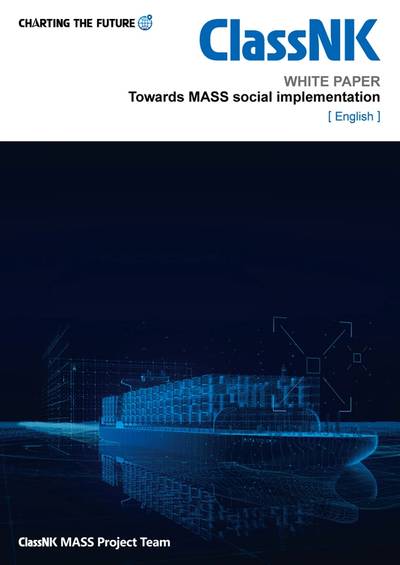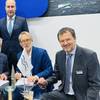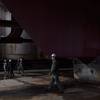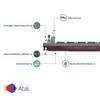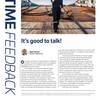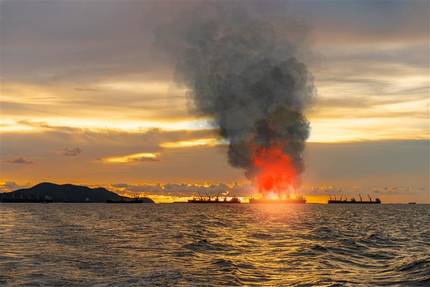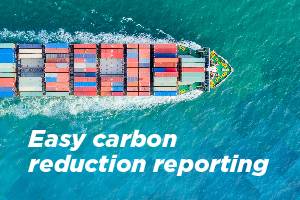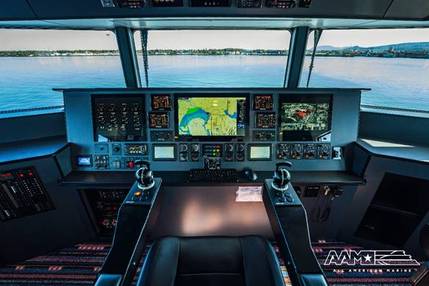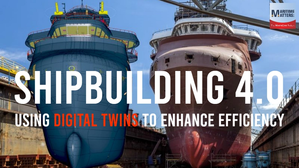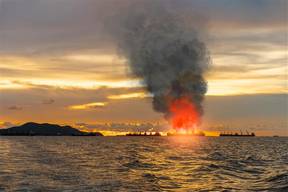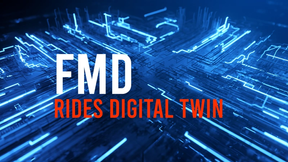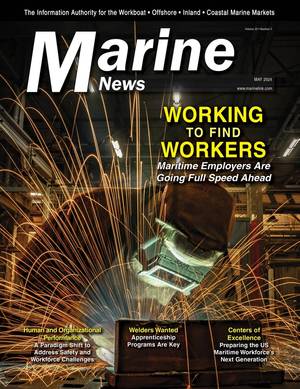ClassNK Contributes to Social Implementation of MASS
ClassNK is taking a leading role in the implementation of safe and efficient maritime autonomous surface ships (MASS) through a program of research, rule-development, technology trials and certification.
While the regulatory framework covering MASS remains a work in progress, it is clear that autonomous ship technologies are already having a transformative effect on shipping.
By autonomously executing certain functions that would typically be performed by crew – especially tasks related to navigation – MASS technologies can reduce the operational burden on seafarers and minimize the risk of human error, thereby enhancing the efficiency and safety of shipping operations. They also hold the potential to help solve issues raised by continuing shortages in key areas of the maritime workforce.
Given the significant benefits that MASS are expected to bring, foundations are being laid globally for their introduction this decade. The mandatory MASS Code – MSC 111 – is due to be adopted in 2026 ahead of entry into force on 1 January 2028.
Meanwhile, Norway and several Asian countries including Japan have been leading research and development towards the realization of autonomous shipping, and practical implementation of MASS is expected from 2025.
With just a few years remaining on the projected timeline before the mandatory code is adopted and MASS entering the Japanese domestic market, Japan-based classification society ClassNK (the Society) is fully engaged in the certification, rule-development and trialling that will enable social implementation.
Active since 2018, the ClassNK MASS Project Team has been responsible for risk assessment in several projects under the Nippon Foundation’s MEGURI2040 Fully Autonomous Ship Program, which aims to “implement fully autonomous navigation to support the ocean of the future”.
In 2022, the Society granted approval in principle for the ‘APExS-auto’ fully autonomous ship framework. Developed by NYK Line, MTI Co., Ltd. and JMS Inc., APExS-auto represents an expansion of the crewed autonomous ship framework – APExS (Action Planning and Execution System) – positioning the computer as an active supporter of the crew capable of executing sophisticated functions. Furthermore, ClassNK will contribute to its upcoming demonstration test by technology qualification as well as classification survey.
ClassNK has also been active in the certification of innovative technologies for smart ships. Groke Technologies’ camera sensor system, for example, combines information from various sensor inputs to support advanced situational awareness. Another solution, from Furuno Electric Co., Ltd, deploys virtual technology to offer the user a 3D, bird’s-eye view of the vessel, again providing optimised situational awareness. More technologies have received ClassNK’s ‘Innovation Endorsement’ following thorough verification, including those covering shore-connection, navigation monitoring, or cyber protection, enabling advanced vessel management and operational support for safe, secure and smart management of ship operations.
In the rule-development domain, ClassNK has participated in the International Association of Classification Societies’ expert group on MASS since January 2020, contributing to considerations for the design and construction of MASS and related systems. In 2018, the Society issued a provisional version of its Guidelines for Concept Design of Automated Operation/Autonomous Operation of Ships, with its Guidelines for Automated/Autonomous Operation of Ships following in 2020. It has also assisted in the publication of the Japanese government’s MASS guidelines.
With the aim of accelerating discussions and addressing concerns surrounding what remain fast-developing technologies, ClassNK is also working hard to share information on autonomous shipping. The Society contributes papers to national and international journals, has published a special feature on ‘Autonomous Operation’ in its Technical Journal and recently published a white paper on the topic.
Drawing on the findings of ClassNK’s research, certification and rule-development activities, the paper – Towards MASS social implementation – proposes a safety assessment framework for the design, development and operation of autonomous vessels.
In the design and development phase, ClassNK aligns with global regulatory consensus in recommending a goal-based approach, to account for the wide range of use cases that MASS are expected to offer and the various technologies that each will require. Given the complexity of MASS as a system, the Society proposes to make use of the concept of V-model in systems engineering. In this model, requirements are identified in a top-down manner at the design stage, and verification is carried out in a bottom-up manner according to these requirements.
Safety assessment based on V-model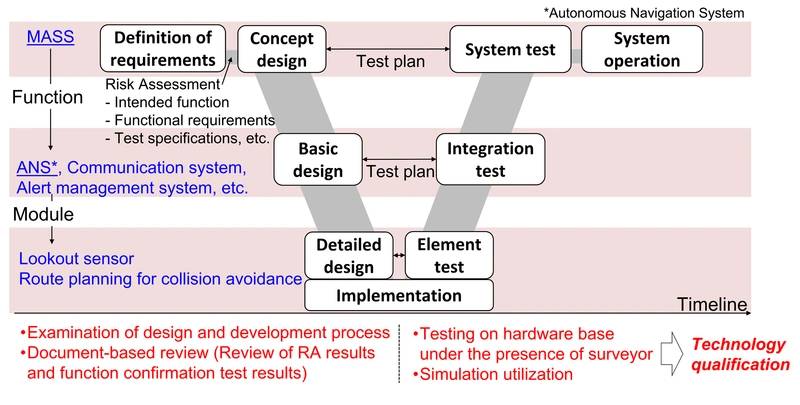 Image courtesy ClassNKIn the operation phase, since novel technologies can only be fully understood once they have been implemented, ClassNK also advocates a ‘vulnerability database’ for sharing feedback from users with those responsible for technology development, rule development and safety evaluation, where data on defects and near-miss incidents is gathered and used as a foundation for continuously updating regulatory requirements and evaluation methods.ClassNK believes the processes described in its white paper will be crucial to facilitating the social implementation of MASS and ensuring the technology fulfils its potential to enable safer, more efficient shipping operations.
Image courtesy ClassNKIn the operation phase, since novel technologies can only be fully understood once they have been implemented, ClassNK also advocates a ‘vulnerability database’ for sharing feedback from users with those responsible for technology development, rule development and safety evaluation, where data on defects and near-miss incidents is gathered and used as a foundation for continuously updating regulatory requirements and evaluation methods.ClassNK believes the processes described in its white paper will be crucial to facilitating the social implementation of MASS and ensuring the technology fulfils its potential to enable safer, more efficient shipping operations.


